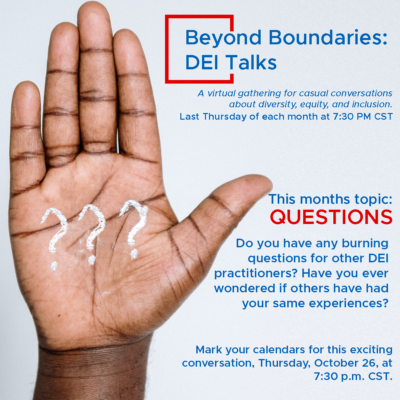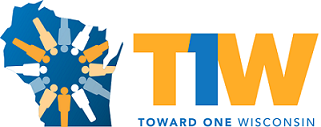 For this month’s Beyond Boundaries: DEI Talks we will be asking and answering questions! Do you have any burning questions for other DEI practitioners? Have you ever wondered if others have had your same experiences? Mark your calendars for this exciting conversation, Thursday, October 26, at 7:30 p.m. CST.
For this month’s Beyond Boundaries: DEI Talks we will be asking and answering questions! Do you have any burning questions for other DEI practitioners? Have you ever wondered if others have had your same experiences? Mark your calendars for this exciting conversation, Thursday, October 26, at 7:30 p.m. CST.
You can join the virtual discussion group through this zoom link or by adding the event to your Outlook Calendar.
Every month, we dive headfirst into the hot topics and burning questions surrounding diversity, equity, and inclusion. It’s where ideas collide, perspectives expand, and innovation ignites. These monthly virtual gatherings break the mold and redefining the way we connect in the DEI universe.
Last month we discussed conflict resolution and how it relates to the work of DEI. Before diving into discussion, attendees heard a brief overview of how conflict resolution works as well as different approaches. There was no shortage of great conversation! Attendees were asked to share their perspective on how conflict resolution actually works in their places of work, organizations, or communities, as well as what is missing when it comes to a DEI approach to conflict resolution.
Below you will find a collection of quotes from September’s Beyond Boundaries: DEI Talks
“I would like to say, I have learned so much tonight, and I mean from everyone and their stories and their ideas from a very diverse point of view. I love it. Thank you all very much”
“One of the challenges that I’m dealing with is a culture that is very polite, but not kind. There’s just so many things that pass for passive, aggressive microaggressions that just it’s so common. And I’m not really used to functioning in an environment like that, because I’m direct.”
“I think that’s one of the biggest challenges that maybe we face right now within our workplace is that I don’t know that everyone, as far as our employee base, feels that level of emotional safety to be able to have these types of conversations.
I think it was it was helpful to see how important that is to have that safe space, how important it is. And so that was really helpful.”
“We have to gradually grow beyond that that Band-Aid fix mentality. it’s not ‘Oh, okay, this situation has arisen. Okay, one and done we seem to have rectified the problem, we move on.’ No. It’s building that ongoing systematic Dei infrastructure that becomes a part of the organizational structure. Right. It’s not just this one and done type.”
“I see 2 extremes sometimes in these conversations. One is the toxic positivity where you just want people to hurry up and get over it, and grit your teeth and bear it. And then there’s the other extreme where people just kind of stay dwelling in whatever the offense is or whatever the disagreement is, they can’t see this their way past to start talking about solutions right.
What I think is a way to bridge those 2 extremes is to get people to find a common language for talking about things, and again it can’t be a one and done. It has to be repetitive. But the more you introduce language into people’s lexicon, that is how we talk about these things. So that people are not feeling marginalized. Because it’s easy. If you’ve been marginalized, to kind of go into that… It’s like a broken record or tape that can play over and over. And it’s from trauma.”
